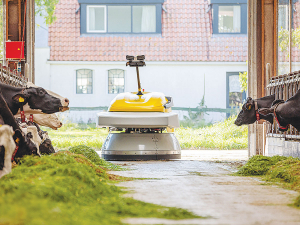Dairy automation company Lely reported a 3.4% decline in total turnover last year but notes that sales are picking up.
The Dutch company, a global leader in automated systems and data management for dairy farmers, presented its annual results for 2024 with a total turnover of €857 million (NZ$1.56 billion), compared to €888 million (NZ$1.6b) the previous year.
The company says the revenue decline of 3.4% reflects the global political uncertainty for dairy farmers and the agricultural sector in general.
However, it says that the last quarter of 2024 showed good resilience and a bounce back to normal levels of sales, which gives confidence heading towards 2025.
Lely continues to invest 8.8% of total turnover in research & development for new innovations to realise the ‘Farm of the Future’.
Lely chief executive André van Troost notes that as 2024 has been a tough and challenging year, they are not surprised by the slightly lower results.
The ongoing uncertainty in the agricultural sector globally, in combination with stricter regulations, increased production costs and low but gradually improving milk prices, make farmers hesitant to invest, he says.
“At the same time, we continue to see a growing demand for sustainably produced dairy with an expected growth in dairy intake of around 2% worldwide.
“Also, the adoption of robotics and data management continues to increase. Additionally, I am proud that we have launched three new products in September.
“These are important next steps towards realising the Farm of the Future. We expect 2025 to be quite challenging, but we are confident that we are working towards a healthy future for generations to come.”
Van Troost says that the order book is slightly better than last year.
“In addition, we see higher milk prices and signs of declining interest rates for farmers. At the same time, we observe ongoing uncertainty in the agricultural sector globally.
“We will continue to support our farmers worldwide in their work to produce sustainable and nutritious dairy products. The long-term outlook for robotics and data management remains very bright.”
Last year, Lely launched three “impactful solutions” for monitoring, feeding and manure handling at the Yellow Revolution event.
“With the launch of cow and barn monitoring system Zeta, feed pusher for large-scale farms Juno Max and next generation manure robot Discovery Collector C2 with sand flush accessory, we aim to answer the challenges faced by dairy farmers worldwide,” says van Troost. He notes that last year, the adoption of robotics and data continued to increase globally.
“Thanks to our dedicated and focused Lely Center network, combined with well performing products, we see high customer satisfaction scores. Last year, we celebrated 20 years of Discovery manure solutions, the installation of the 50,000th Astronaut and the installation of the first Exos in Germany.
“In September we launched our new strategy for 2025-2030. Although the dairy sector remains our primary focus, we have included exploring alternative proteins as an additional source of income for the farmer. With our new strategy, we continue to build a bright future for our farmers.”


















